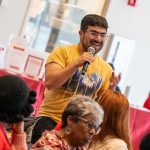First-Generation Students Share Inspiring Journeys at Stony Brook

At Stony Brook University, approximately 40 percent of the nearly 18,000 undergraduates identify as first-generation college students. These individuals often navigate the complexities of higher education without familial guidance, balancing rigorous coursework with jobs and family responsibilities. To celebrate their resilience, Stony Brook hosts First-Generation Week each November, aligning with the national First-Generation College Celebration. This year’s events began on November 3, 2023, featuring workshops, networking opportunities, and community-building programs aimed at empowering these students.
The opening event, a brunch and panel discussion held in the Student Union Ballroom, attracted over 50 attendees, including students, faculty, and staff. Organized by the First Generation Committee, the panel showcased personal narratives of perseverance and belonging. As Mariana Torres, assistant dean for Academic Advising and a first-generation graduate, stated, “Being first-generation means setting new standards and creating new traditions.”
Panelists included Cydney Munro, an academic advisor; Giselle Castro and Cenia Larios, both Master of Social Work Advanced Standing students; Saniya Lopez, a business management major; Celia Marshik, dean of the Graduate School; and Jose Romero-Diaz, a Bachelor of Social Work student. Their stories highlighted the common challenges of adjusting to college life and the pressure to succeed for both themselves and their families.
Romero-Diaz shared his tumultuous journey, explaining, “My college experience has been very turbulent. I had to drop out due to financial and personal circumstances, and I worked in the service industry for 10 years before coming back.” His determination ultimately led him to join the Tri-Alpha Honor Society for first-generation students and Phi Theta Kappa.
Larios recounted her own struggles to find her path. “It took me a little while to get here. I started and stopped at different colleges before realizing social work was where I was meant to be.” Munro emphasized the importance of involvement in campus life, saying, “Getting involved was a game-changer.”
Lopez reflected on her initial doubts about belonging in college, noting, “I didn’t think I was going to college. My family was struggling financially, and I applied late.” Her experience changed after she found community through campus involvement. Castro discussed her shift in academic focus: “I thought I was going to be a dentist, but I wasn’t good at science. It was hard to explain to my family why I changed my major.”
Communicating their college experiences to family members who had not pursued higher education posed a significant challenge for many. Munro shared how she involved her family by FaceTiming to show them campus life. “Just sharing my day helped them feel part of the experience,” she said.
Marshik, reflecting on her journey as a first-generation student, noted the distance between her aspirations and her family’s understanding. “My parents wanted me to go to college but didn’t want me to go too far. They didn’t understand the significance of things like graduation ceremonies,” she stated.
Romero-Diaz encouraged students to seek help, asserting, “It’s hard to feel like you belong. But asking for help isn’t a weakness. It’s a sign of strength.” Munro underscored the importance of mentorship: “As a student, I didn’t take advantage of resources because I didn’t know they existed. That’s why I tell first-gen students now: find a mentor, ask for help, and use the support systems that are here for you.”
Larios concluded the discussion by presenting a small marble to the audience, symbolizing perseverance. “Someone once gave me this as a reminder of perseverance. Every time I look at it, it reminds me why I’m here and why I keep going,” she said, inviting attendees to receive one for themselves.
Each panelist offered advice for first-generation students embarking on their college journeys. Castro emphasized the importance of asking for help, saying, “I wish I had done it sooner.” Larios encouraged students to build their communities, while Marshik recommended utilizing professors’ office hours for support.
Torres wrapped up the event with a poignant reminder: “Being first-generation isn’t just about going first. It’s about opening doors so others can follow.”
In addition to the panel discussion, First-Generation Week features sessions on career advising, professional headshots, and social activities designed to equip first-generation students with essential tools for success. The week will culminate with a first-generation café at the UNITI Cultural Center on November 7. This initiative highlights the university’s commitment to supporting first-generation students as they navigate their academic journeys.






